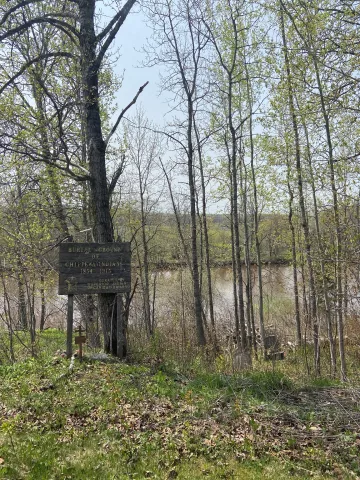In Superior, Wisconsin, conversations about the proposed Nemadji Trail Energy Center (NTEC) are heating up. This gas plant, first proposed in 2017, has been stalled for the last seven years as utilities try to push it through local, state and federal permitting. If built, this gas plant would be constructed on the bank of the Nemadji River in Superior, directly adjacent to the St. Francis Cemetery, where there is an Indigenous burial ground. The plant would be powered by gas, a fossil fuel made up primarily of methane, which is a potent greenhouse gas that exacerbates climate change and makes our air unhealthy. And the financial burden of construction and operation would be borne by utility customers for decades to come.

Francis Cemetery, with the Nemadji River in the
background.
NTEC is co-proposed by three utilities: Dairyland Power Cooperative, Minnesota Power, and Basin Electric Power Cooperative. These utilities claim there’s a need for the gas plant, but a Sierra Club analysis has shown that the same demand could be met by a portfolio of clean energy and storage resources. A recent study from the Union of Concerned Scientists also questions the reliability of gas plants, especially during extreme weather events, which are becoming ever more common. Climate change is resulting in flooding, cold snaps, heat waves, wildfires resulting in poor air quality and more, and NTEC would only amplify these problems.
The gas plant is also of concern to Tribes in the region, and both the Fond du Lac and Red Cliff Bands of Lake Superior Ojibwe have pushed back on this project throughout the permitting process. In 1918, almost 200 Fond du Lac graves were dug up from their initial resting place and moved to mass graves at St. Francis Cemetery because of an infrastructure project that never materialized. The Band has stated that they believe the current resting site at St. Francis Cemetery will be adversely affected by the construction and operation of NTEC. Red Cliff has also raised concerns about cultural sites, threatened species, medicines, climate change and wetland destruction.
Local leaders and community members have also been raising their voices and outlining their concerns with the project. In particular, Superior Mayor Jim Paine and four city council members, Jenny Van Sickle, Nick Ledin, Garner Moffat and Ruth Ludwig, have concerns about the impacts on climate change, environmental justice and the Fond du Lac burial grounds, local water and wetlands, economic concerns and how NTEC would strain the city’s utilities. In 2018, an explosion at the Husky Refinery in Superior caused significant damage, totaling roughly $550 million, injured workers and triggered the evacuation of thousands of residents due to the release of toxic chemicals. This incident has come up time and again, weighing heavily on a community who wants to prevent similar industrial accidents in the future.
Local leaders have been joined by community members who are detailing their own opposition to the plant. At a January City of Superior Plan Commission meeting, the majority of public comments were in opposition to the plant, urging the utilities to cancel their plans for the sake of residents’ health, climate, and environmental justice.*
So far, Dairyland, Minnesota Power and Basin Electric have refused these calls to cancel this project and invest in cleaner, safer options. How can you help? Check out our action page to find our most current ask: sc.org/NTEC
Interested in helping organize against this fossil fuel plant? Email jadine.sonoda@sierraclub.org.
*Since the original article was published in our print newsletter, the Superior Plan Commission and the Superior City Council denied utilities' request for permits for NTEC.